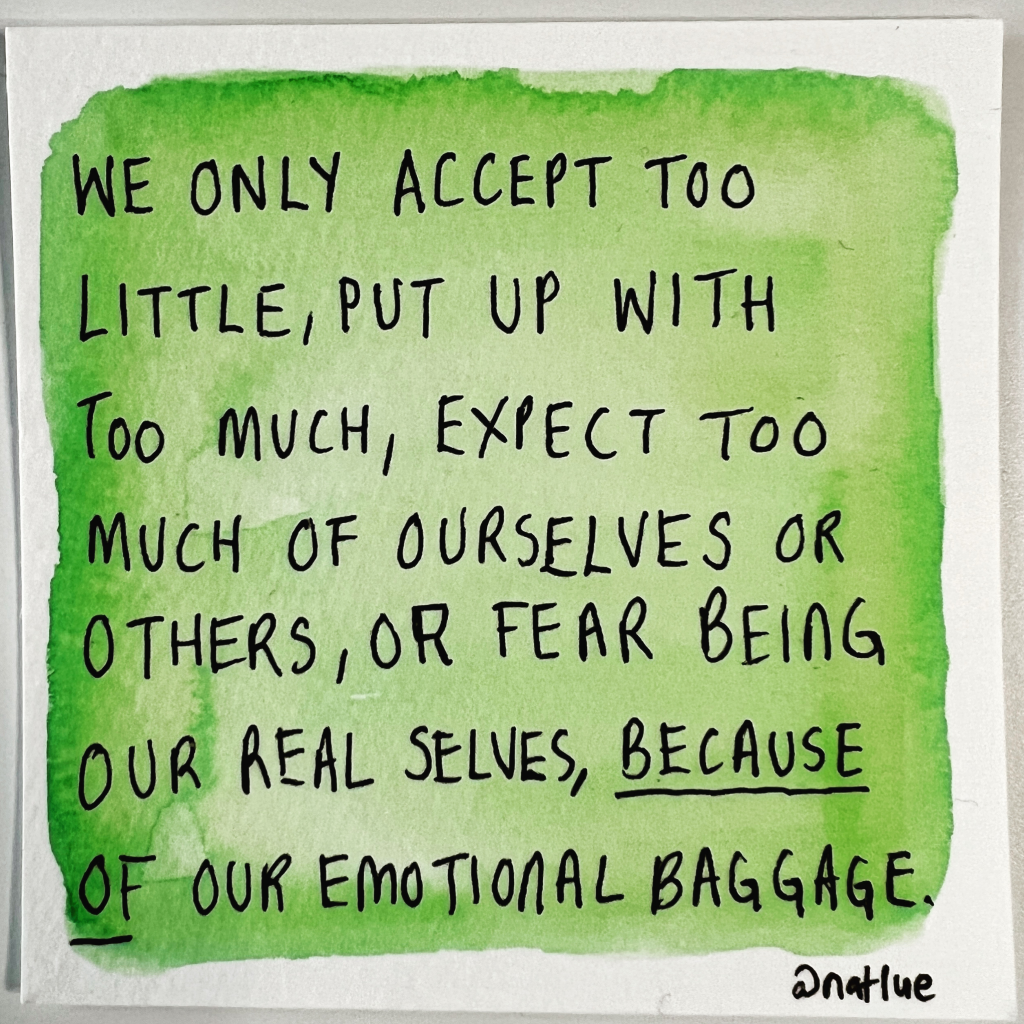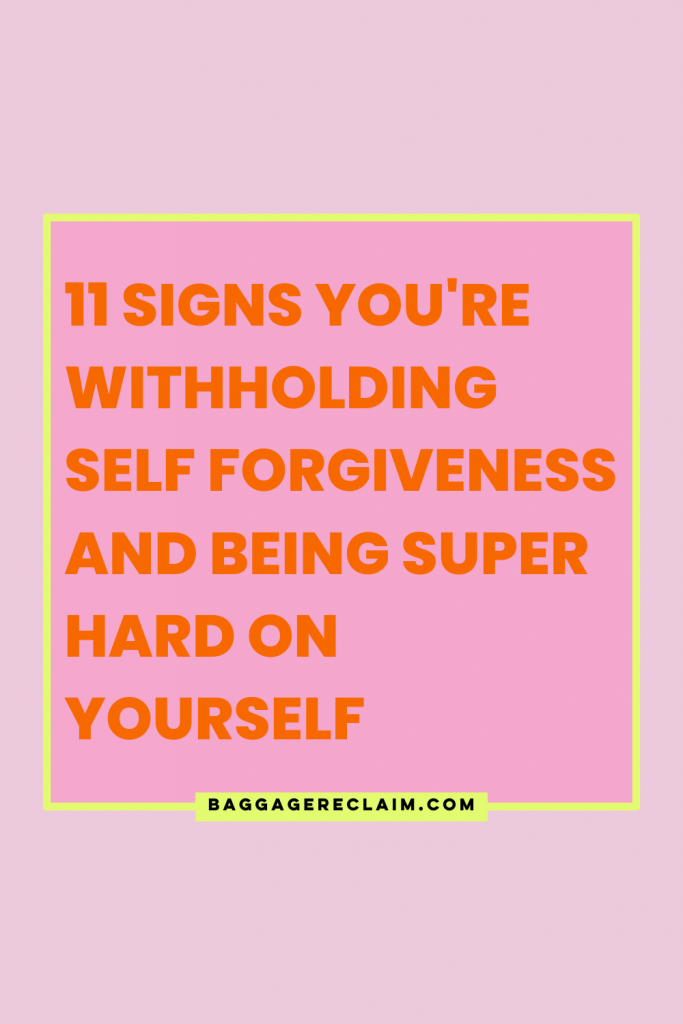It’s easy to misconstrue stressful habits we’ve normalised, such as our anxiety, guardedness and a tendency to overthink and critique as being signs of conscientiousness. We might think we have strong morals or high standards. The truth is, though, that behind the habits that make us feel bad about ourselves and keep us stuck in toxic patterns is a lack of self-forgiveness. Here are 11 signs that you’re withholding self-forgiveness and that you need to make a conscious and concerted effort to be self-compassionate.
Being self-critical in general.
While being self-critical on occasion is to be human, when it’s our default way of life, it’s a toxic habit. Hating on ourselves is something we do due to failure to be what we perceive as perfect. We’re mad at our past and present selves for not being our idealised self. Being judgemental, disapproving and critical drags down our confidence and distorts our self-image. Why are we not allowed to have a past? Why aren’t we allowed the scope to be ourselves and grow? What makes us think we’re so different from the other eight billion people on the planet that we have to be flawless?
Distrusting someone even when they’ve proved themselves trustworthy.
When we don’t trust somebody, they’ve behaved in untrustworthy ways or are trustworthy, but lack of self-trust makes us unable to acknowledge this. Our ability to trust others and use our judgement reflects how much we trust ourselves and our judgement. The only reason we continue to treat someone as untrustworthy despite actual trustworthiness is that we haven’t forgiven ourselves for trusting someone else. We’d rather hold our breath and wait for the other shoe to drop and treat this person as if they’re guilty already than be vulnerable. Being mad at ourselves for trusting someone is like being mad at us for making a best guess. We couldn’t know what we didn’t know. If we don’t forgive ourselves, then we cannot learn self-trust.

Reminding yourself of past mistakes.
We humans have a pesky habit of behaving as if the only way we grow from our mistakes is by repeatedly rubbing our faces in them. What do we do after we throw up? We clean up the vomit. We don’t leave it there to pollute the space and shame ourselves. By not allowing us to let go of our mistakes so that we can move forward with new knowledge gained and take better care of ourselves, we block our healing. We also make ourselves terrified of putting a foot out of place. Yes, it’s hard to make mistakes. Even more so when maybe we grew up believing that we wouldn’t be loved if we were imperfect or that Armageddon would happen. Shaming ourselves instead of being compassionately honest, though, only keeps us stuck in the past.
Being afraid to make the same mistake again and then being in limbo.
Sometimes we judge our past so harshly it makes us terrified of making the wrong decision. We’ll sit on the fence, backtrack or keep trying to anticipate every possible mistake or who this person might be or how the situation will be in the far-off future. We always know fear’s in the driving seat when we’re effectively looking to work out how things will be in ten, twenty, fifty, and infinity years’ time! By vacillating on and even evading and obstructing decisions, we create bigger problems. Hell, possibly they’re the same ones as before. The problem isn’t that we made a mistake or a decision; the problem is that in focusing on what we think we did wrong, we’re missing the wood for the trees.
Not allowing yourself to be happy and possibly blocking yourself from moving forward.
When we believe that we’re only going to get hurt or disappointed, we don’t allow ourselves to get ‘too happy’. If we don’t invest too much, we reason that we’ll experience less hurt; we’ll be prepared. This means that when life gets ‘too hot’, so we’re happier than our identity is used to, we’ll sabotage. We’ll ‘turn the temperature down’ so that we can stay in our comfort zone. But we only hold ourselves to an identity of avoiding ‘too much’ happiness because of our emotional baggage from past events. We clearly haven’t forgiven ourselves and others, hence why we hold ourselves back. It’s vital for us to remember that we are allowed to outgrow old identities. It’s not worth making ourselves lowkey miserable and distrusting 100% of the time for the significantly smaller percentage of occasions when people and life disappoint.
Even when you do allow yourself to be happy for a bit, you start to feel guilty.
When a cloud of guilt hovers over our happiness, it’s because we think we shouldn’t be happy. Guilt is a sense of having committed wrongdoing. We have to ask ourselves what it is we haven’t forgiven ourselves for that we should feel guilty for being happy. The more we connect with (and get honest about) our sense of guilt the easier it is to recognise where we are sabotaging ourselves. We get to acknowledge these feelings and meet them with compassion instead of shame.
Coming up with new concerns and problems to obsess over.
It’s self-sabotage and lack of forgiveness when after addressing or soothing a concern or issue, we breathe out temporarily and then find the next thing. We’re afraid that we’ll leave a potential future mistake or problem unturned and be caught short. Or… we’re using worrying and finding new issues to distract from having to take action and move forward. These are the hidden agendas behind our lack of self-forgiveness. Of course, if we forgave ourselves, we wouldn’t have to be paralysed by overthinking and anxiety. We would know we were okay because we’d have boundaries that reflect this.
Having an attitude that you should have known better.
It’s easy to look back with the 20:20 vision of hindsight and determine that we were knowingly incompetent in the past. Are there times when we all should have known better? Sure. But… they are a lot less than we imagine. I know we like to think we shot out of the womb as fully-fledged people who should know everything or that due to the circumstances of our background or whatever, we should be above certain things. In truth, we’re not. People we regard as geniuses haven’t known better; why should we? Telling ourselves that we ‘should have’ is a judgement against our younger selves. We’re bearing grudges against the us that we were when we originally made the mistake.
When people or life upset you, you’re quickly plunged back into childhood and feeling wounded.
All humans have emotional baggage, and each of us is, was and will be affected by it to greater and lesser degrees. It depends on how we live our lives and respond to challenges, joys and the past. When we spiral into thoughts of injustice, attack and a sense of woundedness dating back to our childhood, it represents the part of ourselves and our past we’re still angry with. Of course, if we consider some of what we haven’t forgiven ourselves for or that we’re using to justify our current behaviour, we can see how grossly unfair we’re being. We can acknowledge what wasn’t right with our life or our actions without persecuting ourselves. As long as we keep telling the stories the same way, it will be easy to be triggered because our younger selves will still feel unsafe.
Withholding attention, affection, approval, love, validation, support, the good life, from yourself.
When we actively go out of our way to withhold, we’re punishing ourselves. We’re acting as judge, jury and executioner. As uncomfortable as it might be to recognise, withholding is something we learned in childhood. It’s likely how adults interacted with us whether as standard or to punish. Or, it’s how they controlled us and made us comply. Punishing ourselves in neglectful and abusive ways, though, reinforces our wounds. It’s like saying that we deserve mistreatment or that we have to earn basic decency. This creates a vicious cycle because the more we withhold, the more anger we build against ourselves.
Accepting sub-par relationships because you’ve decided you don’t deserve better.
Our boundaries and relationships are the great markers of how much we’ve forgiven ourselves and our patterns. There’s no greater tell of our lack of self-forgiveness than our self-neglect, including accepting crumbs and unacceptable treatment from others. It also includes thoughts of being not good enough and not deserving enough. We only behave and think in these ways because of a lack of self-forgiveness. We’re using the past against ourselves which then sets the bar really low. So when we see ourselves accepting questionable, minimal or outrageous behaviour from others or even ourselves, it’s the siren call of old anger. We’re still living in or trying to right the wrongs of the past. And now, we can use this knowledge to be more compassionately aware so that we break those patterns.
While it’s understandable to be disappointed and frustrated in ourselves sometimes, it’s worth asking where (and from whom) we learned this. What’s the baggage behind our lack of self-forgiveness? Where did we learn to not only be hard on ourselves but to refuse to let things go? It’s recognising where we mistakenly believe that being self-critical and unforgiving is motivating or a means of parenting and guiding ourselves. We don’t have to, for instance, keep talking to and about ourselves in the way family, caregivers or bullies did. If we dislike someone else’s judgemental ways, why would we continue to perpetrate that same pattern against ourselves?
Is there a specific aspect of us or an event from our past that spurs our justification for being hard on ourselves? Does being unforgiving help or harm us and our relationships? Repeatedly judging ourselves in the same way(s) is a security blanket. We’re used to reaching for it in certain contexts. Now we can see where we’re not being present and are avoiding vulnerability. Everything humans do is about trying to meet our emotional needs. This means that when we refuse ourselves forgiveness, it’s because of our anger about what we didn’t get. We can use recognition of our self-criticism to reveal (and meet) our unmet needs.
There are better, compassionate, healthy ways of communicating with ourselves without being unforgiving. Self-criticism and withholding forgiveness are learned habits. Thankfully they can be unlearned through the self-forgiveness of healthier boundaries.
Handy Resources
- Download my free audio series The Emotional Baggage Sessions
- Download my free guide and worksheet The Unsent Letter Guide
- Forgiveness Made Simpler
Pin for later


 Add to favorites
Add to favorites 